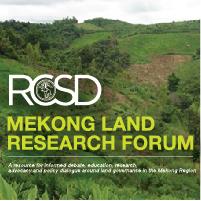Resource information
Land tenure, or access and rights to land, is essential to sustain people’s livelihoods. This paper looks at how farm households perceive land tenure (in)security in relation to food (in)security, and how these perceptions evolve throughout different policy periods in Laos. The paper highlights the centrality of farmers’ strategies in configuring the dynamic relationships between tenure (in)security and food (in)security, by demonstrating how farmers’ perceived and de facto land tenure insecurity shapes their decisions to diversify livelihood options to ensure food security. While the paper’s key findings reveal the close interlinkages between land tenure (in)security and food (in)security, we argue that the first does not automatically result in the latter. In contrast, we show how perceived and de-facto land tenure insecurity pushes farmers to explore alternative strategies and avenues to ensure food supply, through farm and non-farm employment. From a policy perspective, the paper highlights the need to put people’s livelihoods at the center of land governance, thus moving beyond the current positioning of land as merely a means for agricultural production or environmental conservation.



